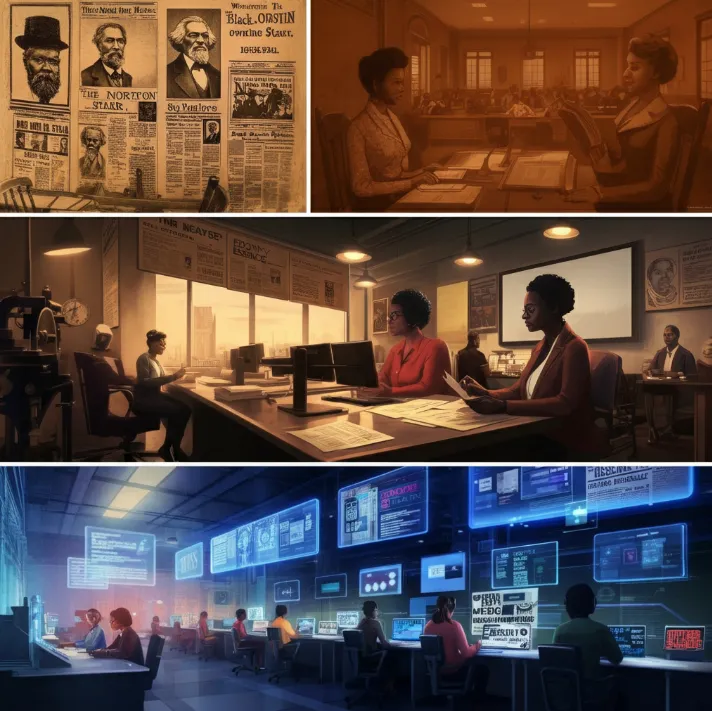Black-owned media has consistently shaped narratives, empowered voices, and created cultural movements that have transcended communities. Through resilience, creativity, and boundless vision, black-owned media outlets have emerged as unique spaces where stories untold by mainstream publications are explored and celebrated. This blog uncovers the roots, significance, challenges, and future of black-owned media, a sector that continues to enrich society and drive progress.
Historical Context
Trailblazers of Black-Owned Media
The origins of black-owned media date back to the 19th century, when black leaders sought ways to reclaim their narratives and challenge systems of oppression. One of the earliest and most iconic milestones was Frederick Douglass’ “The North Star”, established in 1847. This anti-slavery newspaper highlighted abolitionist movements and empowered the black community with information and thought leadership.
Douglass paved the way for a host of publications that addressed education, equality, and the overall plight of African Americans. By the early 20th century, publications like the Chicago Defender rose to prominence, sparking the Great Northern Migration through stories that depicted life beyond Jim Crow laws in the South.
Evolution Through the Decades
From the civil rights era to present day, black-owned media outlets have evolved to capture the spirit of their respective times. By the mid-20th century, iconic magazines like Ebony and Jet became household names, showcasing cultural pride and black excellence. Moving into the digital age, platforms like The Grio and Blavity now champion causes relevant to Millennials and Gen Z, harnessing the power of social media to engage modern audiences.
The Significance of Black-Owned Media
Representation and Voice
Black-owned media amplified suppressed voices long before inclusivity became a buzzword in mainstream media. These platforms provided African Americans with spaces to discuss the realities of systemic racism, advocate for social justice, and celebrate their achievements.
Shaping Unique Narratives
Often, mainstream media overlooks or misrepresents stories from black communities. Black-owned platforms counter these narratives by highlighting authentic experiences, bridging gaps of understanding, and fostering cultural unity.
A Celebration of Culture
Publications such as Essence shine as symbols of empowerment, celebrating black culture, beauty, and style. They serve as accessible guides that encourage cultural pride while dispelling harmful stereotypes.
Key Players in the Industry
Major Influencers
Several black-owned media outlets have made bold and lasting imprints in the industry.
- Ebony Magazine (founded by John H. Johnson in 1945): Focused on celebrating black excellence.
- BET (founded by Robert L. Johnson in 1980): The first television network entirely devoted to black culture.
- The Grio and Blavity’s influence has redefined digital storytelling for younger generations.
Figures Driving Change
Entrepreneurs like Cathy Hughes, founder of Urban One (formerly Radio One), and trailblazers such as John H. Johnson have shown that determination paired with innovation can pierce through systemic barriers to create invaluable media spaces.
Challenges Facing Black-Owned Media
Economic Barriers and Competition
Navigating the cut-throat media industry continues to pose challenges for black-owned outlets. Limited financial resources often hinder sustainability, leaving them at a disadvantage compared to conglomerates.
Struggling for Visibility
Competing against well-funded mainstream corporations for advertiser trust and audience reach frequently overshadows the presence of black-owned publications.
Despite these hurdles, forward-thinkers within the industry remain committed to reinforcing their platforms’ relevance and voices, which are more vital than ever.
Impact on Society
Driving Social Movements
Black-owned media has historically led and supported pivotal social justice movements. Platforms like The North Star and BET have highlighted pressing issues such as racism, police brutality, and economic inequality, influencing public opinion and igniting activism.
Enhancing Diversity in Media
By existing and thriving, black-owned media challenges a traditionally eurocentric media lens and inspires inclusion.
Influencing Cultural Trends
Whether through music, art, or politics, these outlets decisively shape public discourse and influence cultural trends.
The Future of Black-Owned Media
Harnessing Digital Tools
Digital platforms and social media offer promising opportunities for expansion. Black-owned outlets are successfully using Instagram, Twitter, and YouTube to create new spaces for connection and dialogue.
Emerging Players
Startups such as AfroTech and Supa are demonstrating how innovation and entrepreneurial spirit can make an impact despite limited resources.
Strategies for Sustainability
Partnerships, diverse revenue streams, and audience involvement will likely become fundamental strategies in maintaining success.
Black-Owned Media is More Than Media
Black-owned media is far more than magazines or TV shows. It’s a movement, a platform, and a lifeline that continues to impact individuals and communities by reshaping perspectives and amplifying voices.
Want to explore modern pioneers or create your own space in the media landscape? Get inspired by exploring the full landscape and history today.
